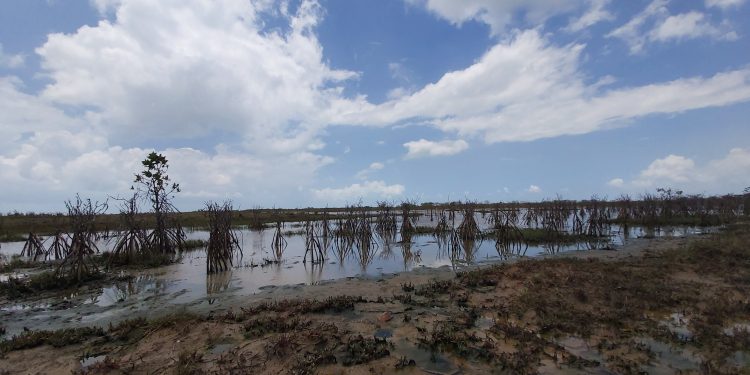Bhubaneswar: Several species of mangrove plants planted by the state government closer to the Pentha beach in the Kendrapara district of Odisha are now dying unnatural deaths due to several reasons.
Few years back a variety of mangrove plants were planted along the areas closer to the Pentha beach in Kendrapara district. The aim was to protect the areas closer to Bay of Bengal from coastal erosion and to prevent sand from venturing into agricultural fields and other areas. This was done keeping in mind the loss of biodiversity due to cyclones in these areas.
However few years down the line, alleged unscientific selection of site seem to be killing hundreds of such mangrove plants planted in the region. A visit by this correspondent to these areas revealed that several of them have dried up and are destroyed while many are on the verge of being destroyed due to lack of nourishment.
Experts claim that wrong site and bad selection of mangrove species could be attributed for the biodiversity loss.
The exercise was otherwise a noble idea. The plan was to nurture the coastal areas, hold the coastal soil, absorb salinity and protect the nearby areas from the harmful effects of saline water of the sea. Mangrove plants are best known for this.
“The selection of the sites and species was wrong. The Rai variety of mangroves has stilt roots which require nourishment from a combination of sea water and fresh water but in this case the site was deprived of flowing sea water. Due to the terrain, it had only stagnant sea water which comes from high tides only,” said Hemant Sahoo, an expert on mangrove plantations.
He also added that other species of the plant like Phoenix Paludosa could have survived in that area and could have thrived if planted en masse in those areas. Harekrushna Mohanty, a resident of Bansagada village which lies close to the site said, “Most of the mangrove plants are dying as they don’t get regular water supply from the sea or any other source. The mangroves planted in other sites which has got regular water supply, have survived.”






































